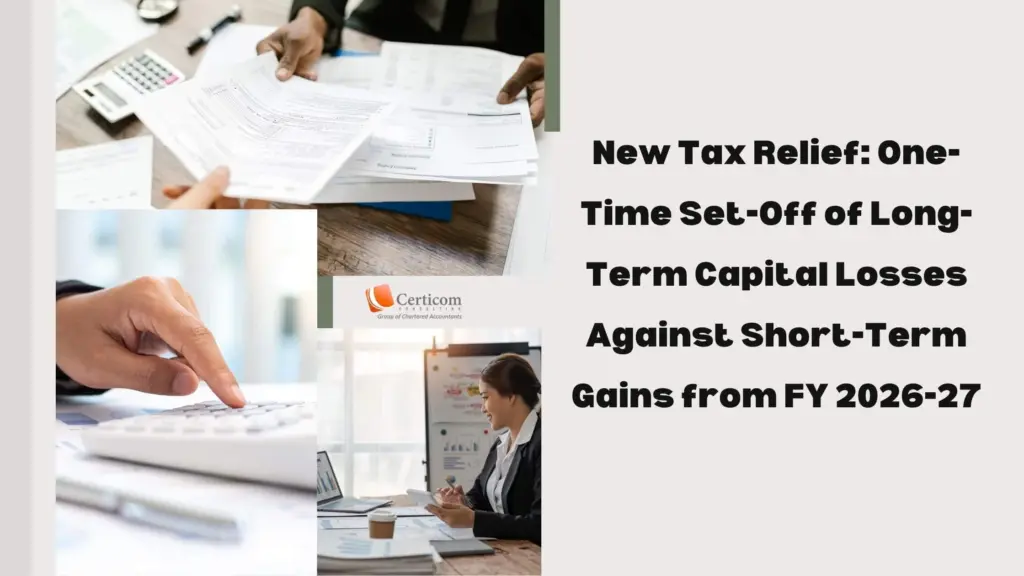New Tax Relief: One-Time Set-Off of Long-Term Capital Losses Against Short-Term Gains from FY 2026-27

The Income Tax Bill, 2025, has introduced a landmark transitional provision that could bring substantial tax relief to investors and individual taxpayers. For the first time, long-term capital losses (LTCL) incurred up to March 31, 2026, will be eligible to offset short-term capital gains (STCG) starting FY 2026-27.
This one-time window of opportunity, enabled under Clause 536(n) of the new bill, presents a powerful capital gains planning strategy before the new law takes full effect.
What Has Changed?
Under the current Income Tax Act, 1961, Section 74 restricts the set-off of LTCL only against LTCG. This narrow rule has long limited the ability of taxpayers to effectively utilize long-term losses — especially when their gains are largely short-term in nature.
But the new Income Tax Bill changes this — temporarily but significantly.

Key Highlights of Clause 536(n)
Brought forward capital losses, whether long-term or short-term, computed under the old Act and remaining as of March 31, 2026, can be:
Set off against any type of capital gains (LTCG or STCG) under the new Act.
Carried forward and adjusted for up to eight financial years (i.e., till FY 2033-34).
🔍 This transitional clause removes the old distinction between STCG and LTCG — but only for pre-April 2026 losses.
Why This Matters for Taxpayers
This one-time measure could be a game changer for those who:
Hold unutilized long-term capital losses due to a mismatch with LTCG.
Are expecting short-term capital gains in the years ahead and want to reduce their capital gains tax.
Missed prior opportunities to optimize their loss harvesting due to rigid pairing rules under the 1961 Act.
The provision permits the set-off of any capital loss — whether long-term or short-term — brought forward as on March 31, 2026, against any capital gains under the new Income Tax Bill, 2025, without differentiating between short- or long-term gains.
Action Plan: Capital Gains Tax Planning Before April 1, 2026
Taxpayers should treat this as a tax planning alert and take the following steps before March 31, 2026:
✅ Review Capital Assets: Identify long-term investments that have declined in value.
✅ Consider Selling Loss-Incurring Assets: Book long-term losses by selling such assets before April 1, 2026.
✅ Document and Report: Ensure proper computation and carry-forward of losses under the 1961 Act.
✅ Plan Future Gains Timing: Align potential STCG after FY 2026-27 to absorb these carried forward LTCL.
This strategy can help minimize tax liability from FY 2026-27 through FY 2033-34.
Why This Is a One-Time Relief
This provision is not a permanent change. It is part of the Repeal and Saving mechanism built into the new tax code to smooth the transition from the old regime.
Post-April 1, 2026 losses will continue to follow the traditional rules under the new Income Tax Bill.
The clause ensures temporary flexibility for existing losses, not a structural overhaul of capital gains taxation.
Some commentators view it as forward-thinking tax reform, while others raise concerns about consistency with broader tax principles. However, for now, it stands as a valuable tool in the taxpayer’s arsenal.

Final Thoughts: Don’t Miss the Window
The new Income Tax Bill, 2025, offers a rare and limited-time opportunity to reset your capital gains tax planning. By utilizing this one-time set-off provision under Clause 536(n), taxpayers can unlock significant savings and efficiently absorb past investment losses.
What You Should Do Next
📊 Re-evaluate your capital loss history
📅 Act before March 31, 2026
👩💼 Consult with your tax advisor for tailored strategies
📈 Plan your future gains with carry-forward optimization in mind
⚠️ This relief is time-bound. Use it wisely before the sunset date, and turn your past losses into future tax gains.
Related Post
Tax Implications of ESOPs and RSUs for Employees
ITR Filing Deadline Extended: New Last Date is September 15
Book A One To One Consultation Now For FREE
How can we help? *




